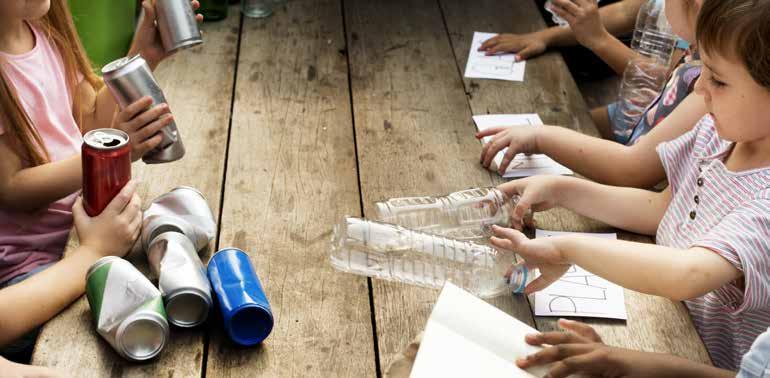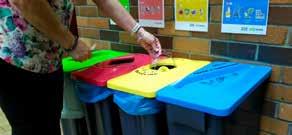
3 minute read
2.4 Waste and Recycling
2.4 Waste and recycling
With a diverse and widespread footprint, the Diocese is committed to significantly improving its waste management practices. We are changing our processes to view waste materials as a resource to maximise the environmental and financial benefits of diverting this material away from landfills contributing to a low carbon future.
Measurable Targets
• Develop a waste volume baseline for the Diocese by 1 January 2024
• Increase our recycling rates to 80% for our construction waste generated by projects by 1 January 2023
• Increase our recycling rates to 70% for our general solid waste by 1 January 2025.
Priority Actions
Establish the Diocese’s baseline waste volumes and accurately measure via contractor reports on an annual basis. This includes waste generated from our construction projects.
Integrate waste generation into a resource management system to accurately measure waste volumes.
Improve contractor management, including cleaner training, to achieve effective general waste separation and recycling targets.
Waste management requirements to be included in all maintenance and construction project contracts to ensure we achieve a minimum recycling rate of 80%.
Establish clear information technology waste management (E-waste) procedures that align with the NSW Environment Protection Authority’s waste hierarchy.
Roll out the Diocese’s standard waste management system across all new sites, and refurbishment of existing sites, that includes four (4) separate waste streams – general waste (landfill), co-mingled plastics and metals recycling, cardboard and paper recycling and food organics composting. Consistent waste management system colouring and branding to be used at each site.
Laudato Si’ Goal Alignment
Response to the Cry of the Earth Adoption of Simple Lifestyles Ecological Economics
UN Sustainable Development Goals Alignment
SDG 9 Industry, Innovation, and Infrastructure SDG 11 Sustainable Cities and Communities SDG 12 Responsible Consumption and Production SDG 17 Partnership for the Goals
Accountability Timeframe
Head of Property Services By 1 January 2024
Head of Property Services and Chief Information Officer
Head of Property Services and Manager of Strategic Assets
Head of Property Services, Head of Governance & Legal and Construction Manager
Chief Information Officer
Head of Property and Agency Directors
By 1 January 2024
By 1 January 2025
By 1 January 2025
By 1 January 2023
By 1 January 2025
Ramping up recycling at Head Office!
With more than 250 staff working from the Diocesan Head Office in Newcastle, a sustainable office waste management system was established to improve recycling rates.
Each office desk has a new desk top mini bin with existing under desk bins removed. The mini bin is used to dispose of general waste and then moved to new internal waste transfer stations on a regular basis. The benefit of this scheme is two-fold:
1. It encourages people to think about their waste volumes; and
2. Our staff have regular breaks from their desks.
New bins have been installed in common areas, including a food organics waste bin in kitchens. In general, food organics comprise up to 30-50% of waste sent to landfills, and we can now divert this from landfills, including the coffee grounds from our machines and soiled paper towel, to be composted into nutrient-rich soil locally. New landfill, co-mingled plastic and paper/cardboard bins have also been installed.
Case Study – CatholicCare’s Food Program
Every week more than 500 meals are provided by CatholicCare to some of the most vulnerable people in our communities.


Contributions from organisations such as OzHarvest, a leading food rescue organisation, enable CatholicCare to deliver food to those in need whilst also saving food from going to landfills.
OzHarvest delivers rescued food and produce from restaurants, cafes and supermarkets to CatholicCare, where staff and volunteers use the ingredients to develop nutritious meals to nourish those who need them most. This includes the homeless, new migrants, people experiencing mental health issues and low-income earners. At the end of the process, the Diocese sorts its waste and diverts food waste from landfill to recycling via a partnership with Feedback Organic Recovery. Feedback, and its partners, provide compost bins and collect any leftover food waste to turn into valuable compost material.
The sustainable efforts in our food programs are aligned to the following UN Sustainable Development Goals:
SDG 1 No Poverty SDG 2 Zero Hunger SDG 12 Responsible Consumption and Production










